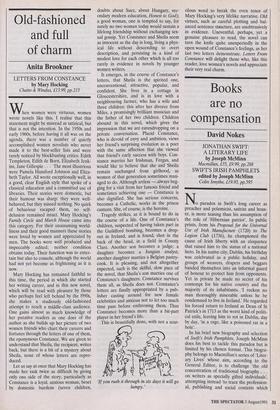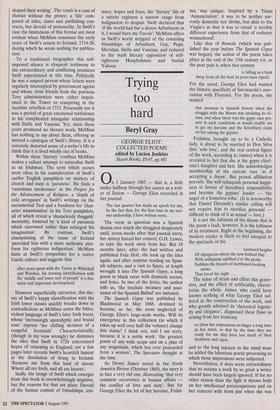Books are no compensation
David Nokes
No paradox in Swift's long career as preacher and polemicist, satirist and hoax- er, is more teasing than his assumption of the role of 'Hibernian patriot'. In public prints, from his Proposal for the Universal Use of Irish Manufacture (1720) to The Legion Club (1736), he championed the cause of Irish liberty with an eloquence that raised him to the status of a national hero. In his native city, Dublin, his birthday was celebrated as a public holiday, and groups of weavers, drapers and beggars banded themselves into an informal guard of honour to protect him from opponents. Yet in private he made no secret of his contempt for his native country and the majority of its inhabitants. 'I reckon no man thoroughly miserable unless he be condemned to live in Ireland.' He regarded his forced return to Ireland as Dean of St Patrick's in 1713 as the worst kind of politi- cal exile, leaving him to rot in Dublin, day by day, 'in a rage, like a poisoned rat in a hole'.
In his brief new biography and selection of Swift's Irish Pamphlets, Joseph McMinn does his best to tackle this paradox but is limited by his chosen format. This biogra- phy belongs to Macmillan's series of 'Liter- ary Lives' whose aim, according to the General Editor, is to challenge 'the old concentration of traditional biography . . . on writers as specially gifted individuals', attempting instead 'to trace the profession- al, publishing and social contexts which shaped their writing'. The result is a case of Hamlet without the prince; a 'life' com- posed of titles, dates and publishing con- tracts, but devoid of personality. In Swift's case the limitations of this format are most evident when McMinn examines the early years of Swift's return to Ireland, 1714-20, during which he wrote nothing for publica- tion.
To a traditional biographer this self- imposed silence is eloquent testimony to the extraordinary and conflicting pressures Swift experienced at this time. Politically he was a suspect person whose letters were regularly intercepted by government agents and whose close friends from the previous Tory administration were either impris- oned in the Tower or conspiring in the Jacobite rebellion of 1715. Personally too it was a period of great emotional turbulence in his complicated triangular relationship with Stella and Vanessa. Yet, since these years produced no literary work, McMinn has nothing to say about them, offering us instead a catalogue of Swift's library. It is a curiously distorted sense of a writer's life to think that it is lived wholly out of books.
Within these 'literary' confines McMinn makes a valiant attempt to naturalise Swift as an Irishman. The term which occurs most often in his consideration of Swift's earlier English pamphlets on matters of church and state is 'paranoia'. He finds a `venomous intolerance' in the Project for the Advancement of Religion, a 'depth of cold arrogance' in Swift's writings on the sacramental Test and a fondness for `char- acter assassination' in his Tory pamphlets, all of which reveal a 'shamelessly thuggish' mentality, fostered by 'a kind of paranoia which narrowed rather than enlarged his imagination'. By contrast, Swift's championing of the cause of Ireland `provided him with a more authentic plat- form for righteous indignation'. McMinn hints at Swift's sympathies for a native Gaelic culture and suggests that
after years spent with the Tories in Whitehall and Windsor, his trusting identification with the 'middle and lower sort of people' is a dra- matic and important development.
However superficially attractive, this the- ory of Swift's happy identification with the Irish lower classes quickly breaks down in contradictions as McMinn notes the bitter, violent language of Swift's later Irish tracts, whose 'increasingly apocalyptic and brutal tone' express 'the chilling derision of a vengeful Jeremiah'. Characteristically, (though in my view wrongly) he dismisses the idea that Swift in 1726 entertained hopes of returning to England; yet a few pages later records Swift's heartfelt lament at the desolation of living in Ireland: `Remove me from this land of slaves/ Where all are fools, and all are knaves'.
Sadly, the image of Swift which emerges from this book is overwhelmingly negative, but the reasons for that are plain. Devoid of the human context of friendships, inti- macy, hopes and fears, the 'literary' life of a satirist registers a narrow range from indignation to despair. Swift declared that `if the world had but a dozen Arbuthnots in it, I would burn my Travels'; McMinn offers us Swift's world stripped of the consoling friendships of Arbuthnot, Gay, Pope, Sheridan, Stella and Vanessa, and reduced to the stark literary opposition of self- righteous Houyhnhnms and bestial Yahoos.



















































 Previous page
Previous page